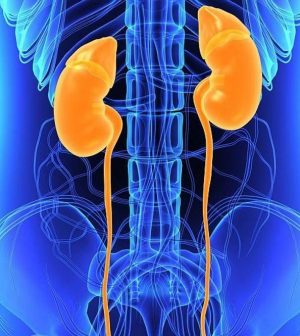- Could Artificial Sweeteners Be Aging the Brain Faster?
- Techniques for Soothing Your Nervous System
- Does the Water in Your House Smell Funny? Here’s Why
- Can a Daily Dose of Apple Cider Vinegar Actually Aid Weight Loss?
- 6 Health Beverages That Can Actually Spike Your Blood Sugar
- Treatment Options for Social Anxiety Disorder
- Understanding the Connection Between Anxiety and Depression
- How Daily Prunes Can Influence Cholesterol and Inflammation
- When to Take B12 for Better Absorption and Energy
- Epsom Salts: Health Benefits and Uses
Kidney Transplant Safe When Organ Donor Has COVID: Study

Even before the pandemic, the demand for donor kidneys far exceeded supply. That shortfall only worsened when hospitals started refusing to use kidneys from COVID-positive donors.
However, new research now suggests that kidneys from deceased COVID-19 patients have almost zero risk of viral transmission to the recipient:
In the new study, out of 55 patients who received such a kidney, none developed COVID-19 after transplant.
“The need for organs is very severe,” noted study author Dr. Alvin Wee, a urologist with the Cleveland Clinic’s transplantation center.
“Even with a record number of transplants in the U.S. for 2021, there are still more people who need lifesaving organs,” Wee noted, with only 20,000 kidney transplants performed each year and 90,000 patients in need.
But the good news is that the investigation shows that “using kidneys from COVID-positive donors is safe,” Wee added.
Prior to the study, there was a real fear that kidney donations from a COVID-positive source could pose a transmission risk, the investigators said, despite the fact that there was no hard evidence showing that the virus could be spread through either urine or blood.
All of the patients enrolled in the study — including 36 men and 19 women — underwent a kidney transplant at the Cleveland Clinic at some point between February and October 2021, during the second year of the pandemic.
Prior to February 2021, Cleveland Clinic had prohibited all donations from COVID-positive patients. Only with the launch of the study were COVID-positive donors considered, and only — at first — from COVID-positive donors who had died from something other than COVID-19. Later on, the donation pool was expanded to include patients who had been seriously ill with COVID-19 before dying.
At the time of transplantation, about two-thirds of the recipients were on dialysis. About two-thirds had also been vaccinated against COVID-19 with a full two-dose regimen.
On the flip side, all 34 donor patients had been diagnosed with COVID-19 at least once during the 11 weeks preceding their death.
The result: Following surgery, none of the donor recipients tested positive for COVID-19. And 14 weeks post-surgery, all the transplanted kidneys were found to be functioning well.
Wee characterized the results as “very positive” all around.
On the one hand, “we are able to transplant more people,” he said. “[And] on the donor side — for families of these patients who died from COVID-19 — the donation and utilization of these lifesaving organs gives meaning to this senseless death that is brought about by this pandemic.”
Wee and his colleagues are scheduled to present their findings this week at the American Urological Association’s annual meeting, in New Orleans. Such research is considered preliminary until published in a peer-reviewed journal.
Concerns over the potential risk for recipient infection is nothing new in the world of organ transplantation, noted Dr. Brian Inouye, chief resident in the division of urology at Duke University in Durham, N.C.
Though not involved in the study, Inouye explained that current guidelines “require donors to be tested for HIV, hepatitis B [HBV] and C [HCV], syphilis, cytomegalovirus, Epstein-Barr virus, toxoplasmosis and, sometimes, tuberculosis.”
Donations from patients with “notorious high-risk viruses” — such as HIV, HBV, and HCV — had at one point been barred, Inouye noted. But recognizing the dire need for organs, new guidance allows physicians “to use these once-restricted organs” under certain conditions, such as offering HIV-positive recipients organs from an HIV-positive donor.
And the latest findings suggest this approach could also work in the context of COVID-19, “as long as the donor medical history is known and shared with the organ-procurement organization, transplantation centers and recipient. Then the recipient, along with the guidance of their transplant team, is allowed the autonomy to make the choice about accepting an organ,” Inouye explained.
More information
There’s more detailed information on kidney donations at the National Kidney Foundation.
SOURCES: Alvin Wee, MD, urologist, transplantation center, Cleveland Clinic; Brian Inouye, MD, chief resident, division of urology, Duke University School of Medicine, Durham, N.C.; American Urological Association meeting, New Orleans, May 13 to 16, 2022
Source: HealthDay
Copyright © 2026 HealthDay. All rights reserved.










